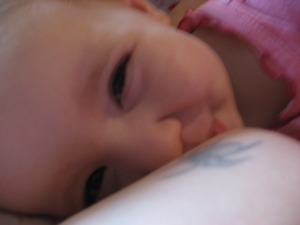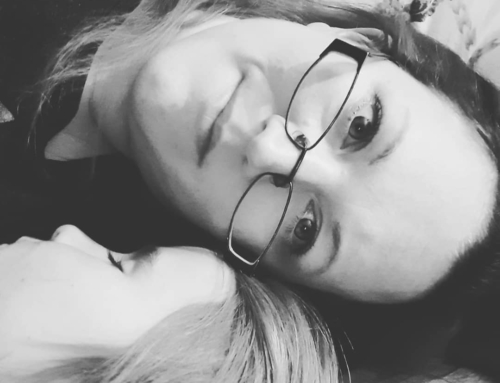“Your baby is now old enough that s/he doesn’t need to feed during the night.”
“Your child doesn’t need to sleep in your room or in your bed.”
“Your baby doesn’t need to be held this much.”
“Your child doesn’t need to still be breastfeeding.”
 Sound familiar? In today’s society parents are often given the unsolicited advice about what their child “doesn’t need”. Really it’s less about telling a parent what their child doesn’t need (as if the parents believe that by not doing this their baby or child will face imminent death), but rather a way to voice displeasure over what this family is doing. In some cases the comment goes so far as to have an undertone that suggests the parents are actually harming their child or their future by engaging in such practices.
Sound familiar? In today’s society parents are often given the unsolicited advice about what their child “doesn’t need”. Really it’s less about telling a parent what their child doesn’t need (as if the parents believe that by not doing this their baby or child will face imminent death), but rather a way to voice displeasure over what this family is doing. In some cases the comment goes so far as to have an undertone that suggests the parents are actually harming their child or their future by engaging in such practices.
Underlying these statements is the premise that we should only be offering our children what they really, truly need. Nothing in addition to those very basic needs, and certainly not what they want. From listening to these comments and further explanations of them, some of it seems to stem from the concern that if you allow your child or baby to do these things that aren’t necessary but provide them with happiness, you are setting them up for failure in today’s society. In our economic-driven, independence-focused, Western society we want children to be able to put aside their own wants to focus on production for… what? Someone else’s business? Someone else’s wants? Someone else’s success? I’m not totally sure how this is something we want for our kids.
Does your baby/child actually need these things?
This is the question many parents are asked and often ask themselves. I will take my own daughter to illustrate my point. She is 3 ½ at this moment and she still breastfeeds (generally on demand, but if she has to wait a little bit, she has to wait), she still bedshares, and she combines the two and still nurses at night. Oh, and she’s very cuddly so I do get to hold her a lot too.
According to many people, my daughter doesn’t need to do any of these things. My own view is that “need” is somewhat relative. Will she die if I weaned her and put her in her own bed in her own room? No, and I sincerely doubt that most people think that is the standard, yet they would persist in reminding me she doesn’t need these things. But what if we looked at need somewhat differently? What if I decided that “need” is going to be based on what I hope for my child and her future?
I hope my daughter grows up and feels utterly secure and comfortable with us as her parents. I hope we can make her feel safe and that she always has a place to go to when she’s feeling sad, upset, scared, hurt, or just in need of some comfort. I hope she feels that she can open up to us and talk to us about any problems she faces. And I hope she feels confident in herself and her own abilities to tackle whatever it is she wants to tackle.
Now if I take those ideas, what does my daughter need at this age for us to reach this “ideal”? Well, I would argue she needs to feel that we are there for her now and that we enable her to feel safe and secure. I hope she feels now that she can come to us no matter what. She needs us to respect her independence and neither restrict it nor force it too early. In looking at these needs, we have chosen to parent the way we do: Breastfeeding, bedsharing, and all. Are these the only ways to ensure the above outcomes? Absolutely not, but the fact that we know they are one way to do it means it’s absolutely acceptable and even beneficial for my family to have chosen these as our way to respond to the needs of our daughter.
Won’t giving in lead to a spoiled child who expects the world on a platter?
The idea here is that if we allow our children to get something they want, especially when it may be at our expense in some way (be it time, inconvenience, etc.), it is setting our children up to feel entitled. If I’m honest, I don’t want my daughter to feel overly entitled and I don’t know a parent that does. It doesn’t benefit our children in the long run to expect to not have to work for things in life as that’s something we all have to learn to do.
That said, I absolutely, 100% want my daughter to feel entitled to love and care and compassion. I want her to feel that she is worth me putting my work aside for a period to respond to her and for her to know I will respond in a way that is best for both of us. I want her to know that I will do all I can to make sure she feels loved. The difference is that this does not mean I will step in to occupy her at all times or tell her she doesn’t need to work. In fact, it’s quite the opposite in our house where she’s expected to be responsible for her things, to help clean up (which is still hit and miss, if I’m honest, but we continue to place that expectation and responsibility on her), and to continue trying and working at new things until she succeeds because she wants to succeed herself (not to please us).
In this vein, I also want her to feel that she has control over her life. If I want her to be responsible, I need to make sure she knows she can affect change and other people. It doesn’t mean giving in to everything, but if she can never obtain what she wants, how can she learn to use her voice? My daughter loves to nurse and as it is doable for me to continue to nurse her (something I realize is not possible for all families), why would I arbitrarily stop it? If I don’t allow her some control over her life – in our case it means deciding when to wean and when to move into her own bed (along with things like picking out her clothes) – how will she learn to have control? These practices are one way that works for our family to provide her with these feelings of control, security, and budding independence.
How can kids learn to be independent if you keep babying them with things they don’t need?
This ideal of independence in our society starts very early for babies and becomes more pronounced with older children. We seem to have this erroneous belief that independence needs to be bread early or it won’t develop. However, like any being or structure, without the right foundation, independence is simply an illusion. Babies need closeness and they need to be responded to in order to develop a sense of security strong enough to allow them to become independent in their own time. We have childhood for the same reason: Children need to explore some independence without being forced into it too quickly and to explore it in a safe environment where they can feel okay if they fail.
Interestingly, looking cross-culturally and historically, children experience lots of responsibilities and independence far earlier than our own Western children while also experiencing these practices of closeness and responsiveness. That is, bedsharing and full-term breastfeeding are the norms in many cultures where children have even more responsibilities than they do in our Western culture. Older children care for younger children, they help care for the home area, animals, and each other. Interwoven in these responsibilities are practices that enable a sense of security as they promote responsiveness and closeness when needed. What others know – that many in our society have forgotten – is that forcing independence is quite different from fostering it.
***
There are lots of things our kids don’t need and there are also many ways to provide for their needs, even when we look outside of their basic needs. When people attempt to tell you that your child doesn’t “need” something, it’s often their way of saying you aren’t doing things the way they did and they see it as “bad” or “harmful”. Though these people may not realize it, there’s more than one way to raise a secure, happy child because there is more than one way of being responsive, and these practices, though not mainstream in Western society, are exactly that: one way of being responsive. What everyone should know is that children will not suffer because of our responsiveness to them, whether that actual act is “needed” or if the child could be responded to in a different way. In a world where we bombard our children with toys and gadgets and electronics and TV time and all sorts of things they really, truly don’t “need” in pretty much any sense of the word, I will continue to be surprised (and dismayed) when I hear people speak about kids not needing parenting practices that are responsive and respectful of the child. After all, isn’t that really all they do need?






Love this! So very well written and hits on pretty much everything I have been feeling since having my daughter 8 months ago (first baby, wonderful experience all around). Though I didn’t realize it before I stumbled across your blog and some others I am very much an attachment parent. But I didn’t make the conscious choice, I went with what felt right, what made sense to me and what is best for my daughter. I’m a physiotherapist so I’m lucky to have gained a lot of education and critical thinking skills over the years, which I realize not a lot of people have, so I have been sharing your blog with friends, family and new mothers.
The thing about the needs, as your write about, is very pertinent in this present age of parenting. There is so much consumerism that suggests you need a baby swing and a bouncer seat and a circle play thingy and bottles and pacifiers and so many toys! But they are not necessary. I breastfeed, I babywear, I use cloth diapers, we do baby led solids, and elimination communication… my daughter doesn’t use a pacifier, she has had expressed milk in a bottle about 5 times in her life, I make my best effort to fully engage with her throughout my day and I respond to her, every time she cries. Sure it’s not always immdiately but I do. And even before I read more research and blogs I have always stood adamant that I will never let her cry it out, though through my readings I’ve discoverd that I think I’ve naturally done some of the meow gentle techniques to help her stay sleeping. And she doesn’t have all the “stuff” or toys that many of her baby friends do. And she’s ok, in fact I’d argue she’s more than ok. People have always commented on how good she is, how alert and aware of her surroundings she is, and how friendly she is. Part of this I know is her temperament but I’m convinced a significant part is because we, as her parents, have responded to her needs for relationship, comfort, warmth, gentleness. We have done, and continue to do, our best to learn her language.
I just love being a mom and I thoroughly enjoy your blog as I feel a little like a kindred spirit. 🙂
Thank you so much for writing this! I don’t get too many comments about what my daughter does or does not ‘need’ but lately I’ve had a few from my parents (we recently relocated across the world to be closer to them) about how she ‘needs to learn to fall asleep without me” and ‘be independent’. Although I am fairly confident about my parenting choices, I do have times when I doubt whether I am doing the right thing. At almost 3 years old, we are still part-time bedsharing and breastfeeding occasionally during the day and a lot at night. She needs me and my boobs) to help her fall asleep at night, and while it can be annoying sometimes, I respect that that is where she’s at and I don’t want to force her to give up nighttime feeding. I recently went back to work after being at home with her for the first 2.5 years, so I feel like the time we get at night helps her feel connected to me after not seeing me most of the day (my husband is a SAHD at the moment).
Love this! My son doesn’t have an easy time with transitions, and often wanted to be carried into his Montesorri preschool class. This always resulted in me getting the stink eye from the staff, I they commented on his lack of independence. However,if he wanted to assert his independence during “line time”. He got in trouble for that. I am glad I follow my heart and give him some extra love and assurance when he asks for it.
Exactly!